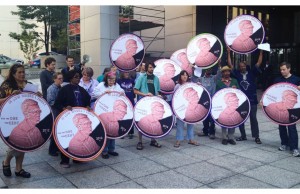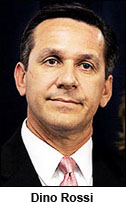ELECTION
McKenna’s third rail: Lower minimum wage
By DAVID GROVES
The Stand
 OLYMPIA (Oct. 18) — A few weeks ago, the state announced that Washington’s minimum wage will increase by 15 cents on Jan. 1, 2013, to $9.19 per hour. If Republican Rob McKenna is elected governor, this could be the last cost-of-living increase the state’s lowest-paid workers get for a while. At least, that’s what the corporate special interests backing his campaign are quietly hoping.
OLYMPIA (Oct. 18) — A few weeks ago, the state announced that Washington’s minimum wage will increase by 15 cents on Jan. 1, 2013, to $9.19 per hour. If Republican Rob McKenna is elected governor, this could be the last cost-of-living increase the state’s lowest-paid workers get for a while. At least, that’s what the corporate special interests backing his campaign are quietly hoping.
It’s an issue that clearly separates McKenna from his labor-endorsed Democratic opponent, Jay Inslee, who voted for modest increases in the state minimum wage as a State Representative and also voted for federal minimum wage hikes as a member of Congress.
But, even though slowing or stopping state minimum wage increases is right at the top of corporate lobbying groups’ legislative agenda, they know it’s an unpopular position. As economists Dean Baker and John Schmitt point out:
Despite criticisms from vocal business opponents, polls consistently show that Democrats, Independents and Republicans all voice support for the minimum wage. This makes sense. Higher minimum wages are about rewarding work and making it possible for workers to earn enough to support a family, with a minimum of government bureaucracy.
That’s particularly true in Washington state. Our minimum wage law — which voters approved by a 2-to-1 margin in 1998 — made Washington the first of several states to automatically increase its lowest legal wage to adjust for inflation. The idea was that full-time workers shouldn’t live in poverty and it was time to take the politics out of the issue.
Rob McKenna has already demonstrated he’s willing to put the politics back.

Low-wage workers and community supporters gathered outside Rob McKenna’s office in Seattle on July 24 — giant McKenna-faced pennies in hand — to give him their “two cents” about his minimum wage opposition. (Click to read the story.)
As Attorney General, McKenna tried to reinterpret the law in order to deny a 12-cent cost of living adjustment in 2011. Citing McKenna’s opinion, corporate lobbying groups representing minimum-wage paying industries sued the state to try to block that year’s increase. A Kittitas County judge quickly ruled against them on summary judgment, saying the law was clear and the 12-cent increase in 2011 should proceed.
But the industries that pay low wages haven’t forgotten McKenna’s advocacy. The PACs for the Washington Farm Bureau, the Washington Restaurant Association (biggest funder: McDonald’s) and the Washington Retail Association have all given the maximum legal contribution to McKenna’s campaign. Plus, four of the six largest low-wage employers in the country have contributed thousands to McKenna — Walmart, McDonald’s, Subway, and Yum Brands (which owns Taco Bell, Pizza Hut and KFC).
Should they succeed in getting McKenna elected governor, these industry groups are counting on him to follow the lead of fellow Republicans in the State Legislature, who propose bills every year to undermine the minimum wage. This year, Rep. Cary Condotta (R-East Wenatchee) — who would control the Commerce and Labor Committee if Republicans seized the House — authored three different bills on the issue:
HB 2497 — Legalizing “tip penalties” where employers can pay sub-minimum wages to workers who earn tips.
HB 2498 — Suspending minimum wage increases in certain years.
HB 1258 — Allowing employers to pay sub-minimum “training” wages.
In fact, Legislative Republicans and the corporate lobbying groups backing McKenna are already laying the public-relations groundwork for a 2013 push for sub-minimum “training” wages for young adults.
Would Gov. McKenna push for a sub-minimum wage? Sure enough, he once let it slip — at a January 2011 Battle Ground Chamber of Commerce meeting — that he supports the training wage idea. But he hasn’t muttered a word about it since. And the commercial press is doing McKenna a huge favor by not asking him about it.
Even the business lobbying groups bankrolling McKenna’s election understand the risk of “going public.” Although its lobbyists (unsuccessfully) pushed to pass all three of the above-mentioned bills, the Washington Retail Association’s video explaining its endorsement of McKenna conspicuously avoids this priority legislative issue.
To understand why this is happening, look back to the last governor’s election.
 Four years ago, Republican Dino Rossi was running neck-and-neck with Gov. Chris Gregoire when, with about a month to go before Election Day, he publicly endorsed the idea of a sub-minimum training wage during a debate before an approving Association of Washington Business audience. Gregoire immediately responded with a TV ad criticizing Rossi for supporting a lower minimum wage. Rossi supporters cried foul, claiming his support for a sub-minimum training wage wasn’t the same as supporting “a lower minimum wage.”
Four years ago, Republican Dino Rossi was running neck-and-neck with Gov. Chris Gregoire when, with about a month to go before Election Day, he publicly endorsed the idea of a sub-minimum training wage during a debate before an approving Association of Washington Business audience. Gregoire immediately responded with a TV ad criticizing Rossi for supporting a lower minimum wage. Rossi supporters cried foul, claiming his support for a sub-minimum training wage wasn’t the same as supporting “a lower minimum wage.”
But the damage was done. Over the next few weeks, polls gradually showed Gregoire pulling ahead and she eventually won by a relatively comfortable 195,000-vote margin (6.5%), compared to her disputed 133-vote victory over Rossi in 2004.
Political observers — on both the left and the right — cited the minimum wage issue as costing Rossi the election.
Clearly, that lesson hasn’t been lost on Rob McKenna. So when it comes to his minimum wage plans, mum’s the word.
An interesting side note, in assessing minimum wage-related political ads against Rossi in 2008 and McKenna in 2012, The Seattle Times — which endorsed both of the Republicans and is now going to unprecedented lengths to push McKenna’s election — split semantic hairs and declared the Rossi ad “misleading” and the McKenna ad “mostly false.”
In the latter case, the Times acknowledges that the ad’s claim was true that McKenna opposed the 2011 minimum wage increase and it was also true that he lobbied to raise his personal pay up to $148,000. But because the ad used the word “while” (implying that those two things occurred simultaneously), the entire ad was dubbed “mostly false.”
You be the judge…





